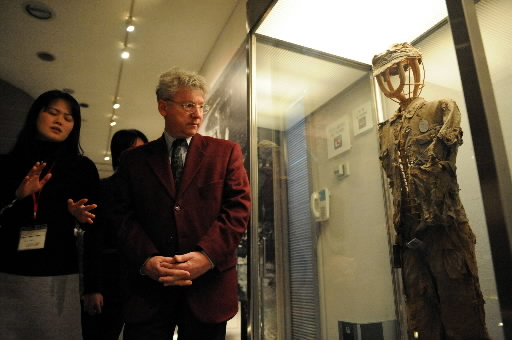Filmmaker Malcolm Clarke visits Hiroshima, seeks to create documentary about the A-bombed city
Feb. 18, 2010
by Uzaemonnaotsuka Tokai, Staff Writer
On February 15, filmmaker Malcolm Clarke, 55, an Academy Award winner for best documentary film, toured Hiroshima Peace Memorial Museum. He visited the museum to prepare for the making of a documentary in which he will interview public figures who have visited the museum. In front of articles left behind by A-bomb victims, Mr. Clarke shared his resolve for the project by saying, "I want the film to show the strength of the city of Hiroshima in conveying to the world the futility of war."
The tentative title for the film is "A World Without War." Mr. Clarke will seek interviews with dozens of people, many of them politicians, including former Soviet President Mikhail Gorbachev and former U.S. President Jimmy Carter, and ask about the influence of their visits to the A-bombed city on their thinking and their political beliefs. The film will also include the story of Sadako Sasaki, who, ten years after the atomic bombing, died of leukemia at the age of 12, a disease induced by the bomb's radiation. In this way, the film will depict the inhumanity of nuclear weapons.
Mr. Clarke first offered flowers at the Cenotaph for the A-bomb Victims. He then toured the museum for about an hour, looking intently at a school uniform tattered by the bomb's thermal rays and a stone wall stained with a human shadow.
"I was shaken up by the sight of these artifacts," Mr. Clarke said. "I'm now keenly aware of the importance of remembering and communicating the past."
Mr. Clarke received the Academy Award in 1989 for his short film about a boy battling malignant lymphoma who was a source of support to other patients.
The interviews for the film "A World Without War" are scheduled to begin in March. Mr. Clarke reportedly has already obtained the informal consent of the 14th Dalai Lama, the supreme leader of Tibetan Buddhism and a Nobel Peace Prize laureate, for an interview. Mr. Clarke said, "I want to convey how the experience of visiting Hiroshima has, like a ripple spreading out from a drop of water in a pool, prevailed in the minds of world leaders." Mr. Clarke plans to complete the film in early 2011.
(Originally published on February 16, 2010)
On February 15, filmmaker Malcolm Clarke, 55, an Academy Award winner for best documentary film, toured Hiroshima Peace Memorial Museum. He visited the museum to prepare for the making of a documentary in which he will interview public figures who have visited the museum. In front of articles left behind by A-bomb victims, Mr. Clarke shared his resolve for the project by saying, "I want the film to show the strength of the city of Hiroshima in conveying to the world the futility of war."
The tentative title for the film is "A World Without War." Mr. Clarke will seek interviews with dozens of people, many of them politicians, including former Soviet President Mikhail Gorbachev and former U.S. President Jimmy Carter, and ask about the influence of their visits to the A-bombed city on their thinking and their political beliefs. The film will also include the story of Sadako Sasaki, who, ten years after the atomic bombing, died of leukemia at the age of 12, a disease induced by the bomb's radiation. In this way, the film will depict the inhumanity of nuclear weapons.
Mr. Clarke first offered flowers at the Cenotaph for the A-bomb Victims. He then toured the museum for about an hour, looking intently at a school uniform tattered by the bomb's thermal rays and a stone wall stained with a human shadow.
"I was shaken up by the sight of these artifacts," Mr. Clarke said. "I'm now keenly aware of the importance of remembering and communicating the past."
Mr. Clarke received the Academy Award in 1989 for his short film about a boy battling malignant lymphoma who was a source of support to other patients.
The interviews for the film "A World Without War" are scheduled to begin in March. Mr. Clarke reportedly has already obtained the informal consent of the 14th Dalai Lama, the supreme leader of Tibetan Buddhism and a Nobel Peace Prize laureate, for an interview. Mr. Clarke said, "I want to convey how the experience of visiting Hiroshima has, like a ripple spreading out from a drop of water in a pool, prevailed in the minds of world leaders." Mr. Clarke plans to complete the film in early 2011.
(Originally published on February 16, 2010)








